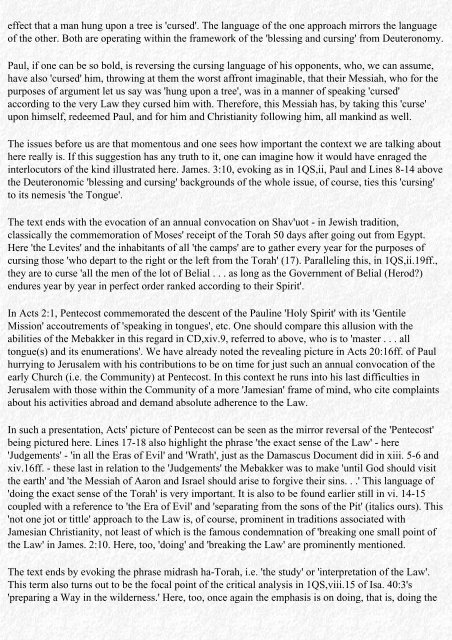Dead Sea Scrolls Uncovered - The Preterist Archive
Dead Sea Scrolls Uncovered - The Preterist Archive
Dead Sea Scrolls Uncovered - The Preterist Archive
You also want an ePaper? Increase the reach of your titles
YUMPU automatically turns print PDFs into web optimized ePapers that Google loves.
effect that a man hung upon a tree is 'cursed'. <strong>The</strong> language of the one approach mirrors the language<br />
of the other. Both are operating within the framework of the 'blessing and cursing' from Deuteronomy.<br />
Paul, if one can be so bold, is reversing the cursing language of his opponents, who, we can assume,<br />
have also 'cursed' him, throwing at them the worst affront imaginable, that their Messiah, who for the<br />
purposes of argument let us say was 'hung upon a tree', was in a manner of speaking 'cursed'<br />
according to the very Law they cursed him with. <strong>The</strong>refore, this Messiah has, by taking this 'curse'<br />
upon himself, redeemed Paul, and for him and Christianity following him, all mankind as well.<br />
<strong>The</strong> issues before us are that momentous and one sees how important the context we are talking about<br />
here really is. If this suggestion has any truth to it, one can imagine how it would have enraged the<br />
interlocutors of the kind illustrated here. James. 3:10, evoking as in 1QS,ii, Paul and Lines 8-14 above<br />
the Deuteronomic 'blessing and cursing' backgrounds of the whole issue, of course, ties this 'cursing'<br />
to its nemesis 'the Tongue'.<br />
<strong>The</strong> text ends with the evocation of an annual convocation on Shav'uot - in Jewish tradition,<br />
classically the commemoration of Moses' receipt of the Torah 50 days after going out from Egypt.<br />
Here 'the Levites' and the inhabitants of all 'the camps' are to gather every year for the purposes of<br />
cursing those 'who depart to the right or the left from the Torah' (17). Paralleling this, in 1QS,ii.19ff.,<br />
they are to curse 'all the men of the lot of Belial . . . as long as the Government of Belial (Herod?)<br />
endures year by year in perfect order ranked according to their Spirit'.<br />
In Acts 2:1, Pentecost commemorated the descent of the Pauline 'Holy Spirit' with its 'Gentile<br />
Mission' accoutrements of 'speaking in tongues', etc. One should compare this allusion with the<br />
abilities of the Mebakker in this regard in CD,xiv.9, referred to above, who is to 'master . . . all<br />
tongue(s) and its enumerations'. We have already noted the revealing picture in Acts 20:16ff. of Paul<br />
hurrying to Jerusalem with his contributions to be on time for just such an annual convocation of the<br />
early Church (i.e. the Community) at Pentecost. In this context he runs into his last difficulties in<br />
Jerusalem with those within the Community of a more 'Jamesian' frame of mind, who cite complaints<br />
about his activities abroad and demand absolute adherence to the Law.<br />
In such a presentation, Acts' picture of Pentecost can be seen as the mirror reversal of the 'Pentecost'<br />
being pictured here. Lines 17-18 also highlight the phrase 'the exact sense of the Law' - here<br />
'Judgements' - 'in all the Eras of Evil' and 'Wrath', just as the Damascus Document did in xiii. 5-6 and<br />
xiv.16ff. - these last in relation to the 'Judgements' the Mebakker was to make 'until God should visit<br />
the earth' and 'the Messiah of Aaron and Israel should arise to forgive their sins. . .' This language of<br />
'doing the exact sense of the Torah' is very important. It is also to be found earlier still in vi. 14-15<br />
coupled with a reference to 'the Era of Evil' and 'separating from the sons of the Pit' (italics ours). This<br />
'not one jot or tittle' approach to the Law is, of course, prominent in traditions associated with<br />
Jamesian Christianity, not least of which is the famous condemnation of 'breaking one small point of<br />
the Law' in James. 2:10. Here, too, 'doing' and 'breaking the Law' are prominently mentioned.<br />
<strong>The</strong> text ends by evoking the phrase midrash ha-Torah, i.e. 'the study' or 'interpretation of the Law'.<br />
This term also turns out to be the focal point of the critical analysis in 1QS,viii.15 of Isa. 40:3's<br />
'preparing a Way in the wilderness.' Here, too, once again the emphasis is on doing, that is, doing the

















